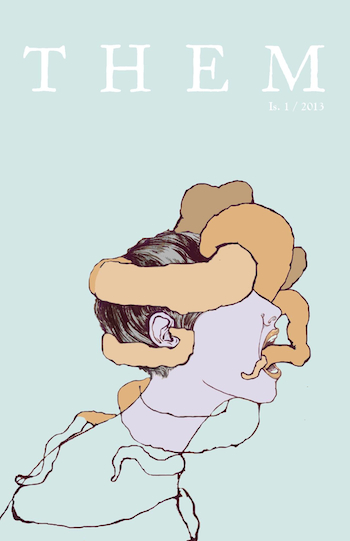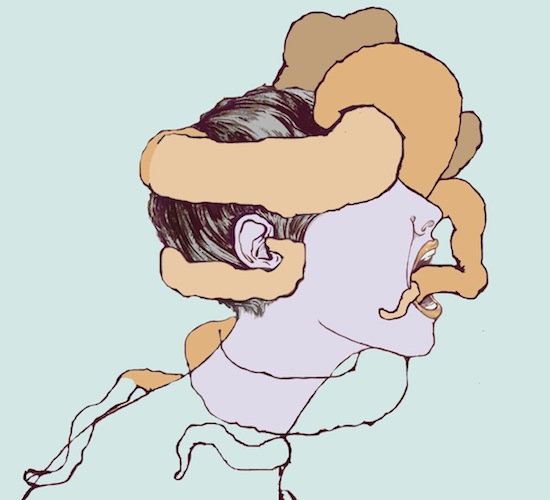To talk of being trans*, for me, is to talk of betrayal. Both in terms of being betrayed and to be assumed in a position of betrayal. I betray wholeness, body, to you, and to myself. I become definable as parts—the hip, the shoulders, the nose, the breast—and space becomes crisis—the bathroom crisis (which do I use today? do I feel like getting yelled at or risk being beaten?), the drive-by crisis (are they going to throw something or just yell?), the ‘coming out’ crisis (do they know? will they leave me? will they assault me? or, god please, at least will they fetishise me?) and so on.
To exist as trans* is to exist in a state of emergency. When I say gender has betrayed me what I mean is writing has betrayed me. It’s grammar working, as it was meant, to undo what it means for this body to be.
There were not words for my experiences or parts. There were never people like me, at least positively, in stories and shows. So I undid. I asked what is left and scavenged. I was committed to language that undid me without considering what it meant to speak.
Fancy men in fancy clothes will tell you writing isn’t safe or to face our ugliness one must risk or any number of fancy things. I don’t know if writing can ever be safe but I do know there is nothing risky in telling the old stories about gender. The old stories I read and read that denied me access and made jokes at my expense. If I was lucky I would see a trans person (almost always a trans woman) be inspirational, Wow so uplifting, they say, but, more often, I saw them dead. Trans* folks’ narrative legacy is almost always, at best, a warning sign.
Therefore as a writer I’ve come to know that submitting a work means either outing myself and writing the inspirational trans story or dead trans story or lying about my gender. Betray what it means to exist or betray myself. THEM, a trans literary journal I founded and edit, is an attempt to facilitate as safe a space as possible for trans folks to write what they want, to avoid the pressure of how they ought to display or not display their gender.
Publishing doesn’t happen in a vacuum. Writing propagates narratives and symbols about who trans folks are alongside YouTube, news outlets, pornography, and so on. Typically, folks like to conflate our differences and syphon us into one discernible narrative. When I look to the few times I’ve encountered trans or gender-variant spaces for writing, I see people acting as if translating our experiences for cis folks in writing is in-and-of-itself radical. Who knows, maybe it is, but what strikes me as more necessary is for trans folks themselves to be able to write outside of and beyond these conventions of cisnormative expectation.
The name, ‘THEM‘, comes from this idea of autonomy in collectivity while, ideally, respecting our differences. We aren’t an us or we. That seems to presuppose there is a given "trans community" or "trans experience". Folks who invoke one, singular "trans community" inevitably silence any critique of norms within that "community". This means trans spaces can end up reinforcing and extending a lot of problematic behavior (shout out to white supremacy, colonisation, ableism, patriarchy, and sizeism in trans and queer "positive" spaces everywhere). Basically, whose trans community are we talking about when we say trans community (or trans solidarity, trans* writing, and so on)?
We aren’t singular; THEM is plural. There is at once comfort and urgency in that. When folks who are systemically denied access to power get together to play with words, there’s not just the possibility of kinship, but a reconfiguration of and claim to power. The name reflects what I’d like THEM to be: open to critique, open to being called out, open to working towards a space that includes trans narratives outside of white supremacist, patriarchal, ableist, etc, trans narrative in other texts.
THEM is a ‘trans only’ journal only as a matter of survival. THEM does not exist to ‘correct’ or ‘teach’ folks about trans people, as if there were discreet and communicable experiences we all had in common. It’s a space for trans* folks to speak and hear one another and cis folks, if they are willing to listen, to work towards unlearning the tropes mobilised against us. Designating our own spaces is the only way for us to have access to narrative in the way cis folks do in their day-to-day lives.
Our inaugural issue, edited by myself, Jamila Cornick, and Emerson Whitney, serves as one representation of what being both trans and a writer can look like. It is not definitive or conclusive – there are countless ways for bodies to be gendered and countless ways to account for that, or not, in writing. The question of ‘what is trans writing?’ or ‘what are the characteristics of trans* writing’ is one that, I don’t think, seems to be a concern of this issue. The writing within issue one often seems to work around normative writing conventions, though. Writers who interrogate language, the ways it constructs identity, and who it privileges, is something I happen to love as an editor. I imagine that has had its impact. Ultimately, I hope, any tendency towards ‘experimental’ works (recognising the cultural arbitrariness of ‘experimental writing’ as a genre) is balanced by writing that is accessible while topically addressing content readers don’t encounter elsewhere.
The politics and commitment to intersectionality for THEM is nothing more than a starting place – the bare minimum. THEM is a journal like any other, trying to publish good writing. The largest difference between a predominantly cis journal and THEM is, I feel, for trans authors to be publishable, in such a cisnormative climate as the publishing world today, they have to be a fantastic writer as a matter of necessity. Those talents are being betrayed though, by a system that publishes only certain texts, very safe texts, about gender. THEM is a space for trans writers to be able to explore those other texts, hopefully without the crisis of having cis people in charge of how their work is published, the pressure and fear that comes with that. To hear and be heard, to encounter how individual trans folks have come to survive in language, explore what writing and being trans is capable of, is not just an enjoyable read, but an act of self-determination and resistance.

Jos Charles is a southern-California writer and founding-editor at THEM – a trans* literary journal. They have poetry published (and/or have publications forthcoming) with BLOOM, Radioactive Moat, EOAGH, as well as variously online. Their writing has also been featured or is forthcoming with Huffington Post , Bitch Magazine, The Fanzine, and elsewhere


